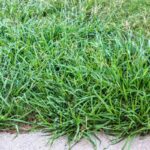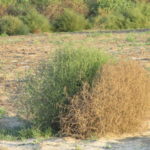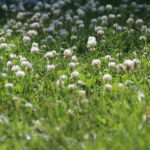
Put down that weed killer. The dandelion, that yellow flower that turns into a puffable white ball, may be a weed to some, but have you considered how dandelions benefit you and your yard? Here are a few reasons you should think twice before trying to eradicate these lovely yellow flowers from your yard. Here’s how dandelions can benefit you and your yard.
Dandelion Health Benefits
Did you know that the dandelion (also known as the Taraxacum officinale) has been used for years in traditional medicine to fight everything from high cholesterol levels and aging to high blood sugar? It’s a medicinal plant that has found its way into various dandelion supplements and vitamins.
Believe it or not, while you may try to rid your yard of it, some people will pay more for dandelion than prime rib or lobster! So, what are dandelions good for?
Let’s look at why this pesky weed can play such a vital role in our health:
- The dandelion plant is a rich source of beta-carotene, which our bodies convert to vitamin A. It is also loaded full of vitamin C, fiber, potassium, iron, zinc, magnesium, calcium, and phosphorus. It contains vitamin D, B complex vitamins, organic sodium, and even has more protein than spinach.
- Dandelion leaves work as a diuretic, which helps to increase the urine that our bodies produce. The leaves also help to give potassium that your body often loses with other diuretics.
- These vitamin-packed greens stimulate the appetite and help with the digestive process, too.
- Dandelion flowers contain high levels of antioxidants.
- Dandelion leaves are rich in potassium, which may help with high blood pressure and prevent heart diseases.
Yes, you might say the dandelion is a true wonder food worth the hefty price. There are many different ways people use it in food and drinks, including dandelion wine. And most are very tasty, too.
So, are you ready to add dandelion to your diet? Here are some ways to incorporate it and what it’ll do for you.
Health Benefits of Dandelion Roots
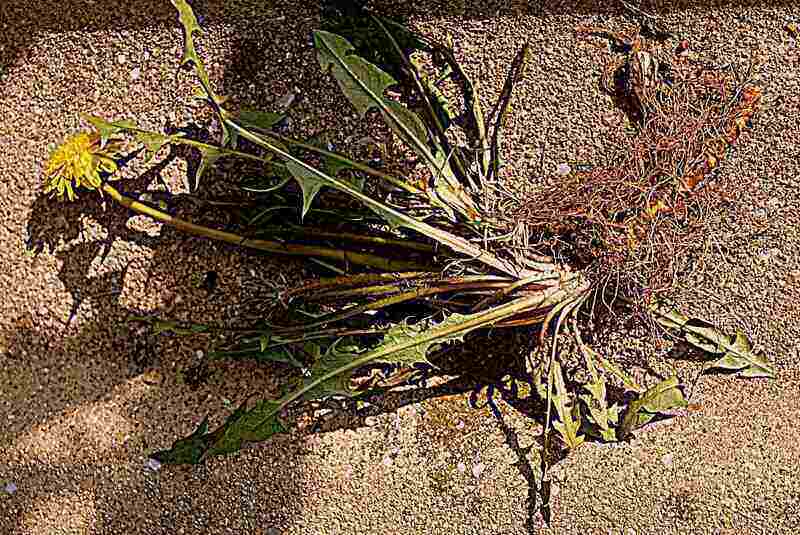
Dandelion roots may be a real pain to remove for homeowners, but you might want to keep them around. The root of the dandelion is often dried and ground to make a dandelion tea or coffee substitute. Or you can use dandelion root extract as herbal medicine by mixing in a favorite tea such as chamomile.
There are many benefits of consuming dandelion root:
- Supports liver health and function
- Fights bacteria such as staph infections
- Neutralizes free radicals
- Reduces bad cholesterol and increases HDL cholesterol
- Potential to kill certain cancer cells
- Protects bones
- Helps brain function
- Balances metabolism
- Anti-inflammatory qualities
- Reduces heartburn
- Regulates blood sugar levels
Dandelion root, combined in a specific formulation with leaf extract from another herb, uva ursi, has medicinal properties that can relieve urinary tract infections in women.
Dandelion tea is quite simple to make. You can find organic dandelion tea bags at most health food stores, and it’s becoming more common even at grocery stores. Look for a quality brand and follow the instructions on how long to steep the tea bags.
If you prefer to DIY your dandelion tea with the dandelions freshly picked from your own front yard, here’s how:
How to make dandelion root tea:
- Gather a few dandelion roots from your pesticide-free lawn and chop up the root.
- Boil a cup of water.
- Steep a tablespoon of the roots in about five ounces of boiling water for 30 minutes.
- If you want to make more of a coffee-like beverage, chop up the root and dry it out by roasting it in the oven for about two hours at 300 F. Then steep it for 10 minutes in hot water.
Caution: The tea is also a mild laxative, which will help alleviate constipation.
Health Benefits of Dandelion Leaves
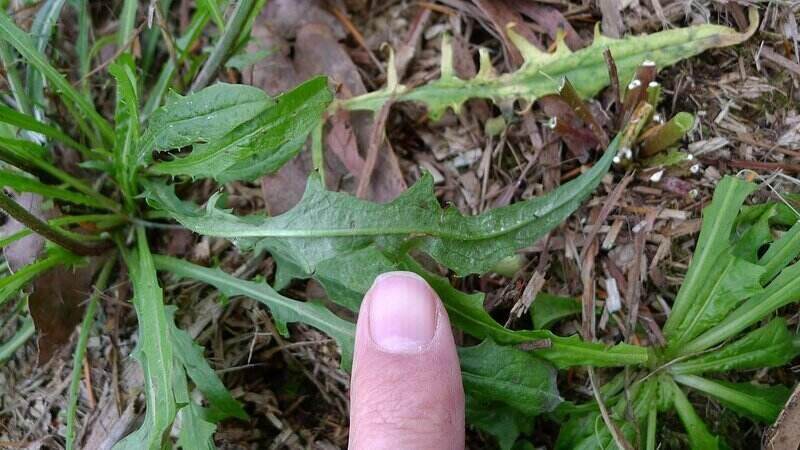
Dandelion leaves also have many health benefits. They are packed with vitamins and nutrients that your body needs, like vitamins K, A, and C, magnesium, potassium, and B vitamins.
There are many benefits of consuming dandelion leaves:
- Reduces high cholesterol
- Promotes eye health
- Decreases water weight (diuretic effect)
- Reduces bloating
- Promotes weight loss
- Protects against liver disease from oxidative stress
- Improves the immune system
Dandelion greens have an earthy, nutty flavor to them that is similar to endive or radicchio. To eat them, you can add them to salads, sauté them, or even chop them up and mix them in salsa or pesto sauce.
You can buy them already mixed into salad greens or as a bunch that you can add to a favorite salad recipe. They are available at health food stores, many grocery store chains, or online.
Health Benefits of Dandelion Flowers
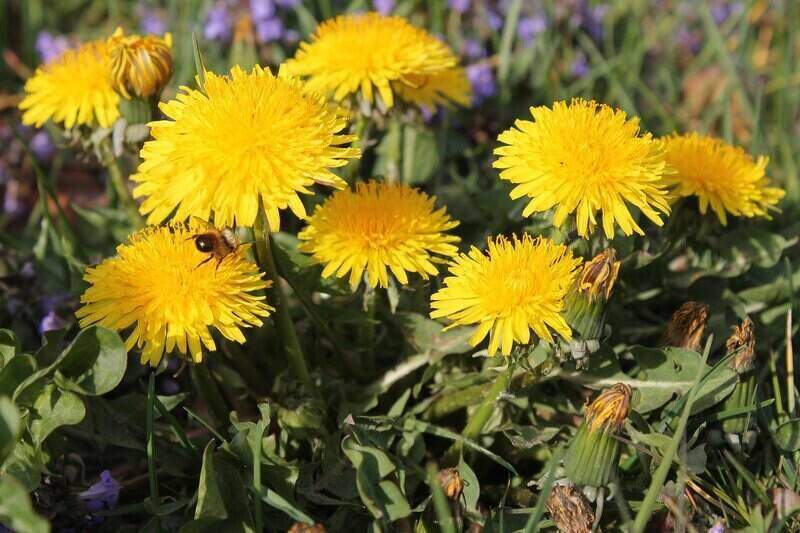
Yes, even the dandelion flower is good for you! While the flowers haven’t been researched as extensively as the roots and leaves, here are some of the benefits that have been found:
- Stomach cramp relief
- Alleviates depression
- Pain relief from backaches, headaches, etc.
- Improved vision, including night vision
- Rich in antioxidants
There are all kinds of creative ways to eat dandelion flowers. A simple Google search reveals everything from dandelion flower cookies to dandelion blossom jelly. You can also dry them and steep them in water for a refreshing (and healthy) tea.
Precautions
Dandelions aren’t for everyone. Those who have allergic reactions to ragweed and related plants such as daisies, marigolds, and chrysanthemums are more likely to be allergic to dandelions, as well.
Note: Before consuming dandelions, it’s best to consult your healthcare provider. The effects of dandelion on your body could be very beneficial or lead to adverse side effects, so it’s better to be cautious. The information in this article is not designed to replace medical advice.
Benefits of Dandelions in Your Yard
Yes, the health benefits of dandelions are numerous, but they are also great for your yard. According to garden expert Mary Nielsen of Buchanan’s Native Plants in Houston, dandelions are super beneficial. Here’s why:
They attract beneficial insects and pollinators: “Dandelions are very good for the beneficial insects and pollinators in your yard,” she said. While they are not native, they’re now a naturalized plant throughout the entire country.
They’ve found a niche in nature — because they’re one of the first plants to flower in spring, they play an important role as an early source of pollen and nectar for bees and other pollinating insects.
They bring nutrients to the surface of the soil: “And they have tap roots that accumulate nutrients deep down in the soil and bring them to the surface, which helps the other plants in your yard,” Nielsen notes.
They aerate the soil: Not only do they help surrounding plants get much-needed nutrients, but they also aerate the soil. “You can leave dandelions in an area of poor soil, and they will actually improve it,” said Nielsen.
Dandelion’s Beneficial History
Unfortunately, when most people visit stores like Buchanan’s about dandelions, they are looking for ways to get rid of them. But this wasn’t always the case.
Dandelions have been around since ancient times. They grow all over the world (and have for thousands of years) and were used by the Chinese, Romans, and Greeks for medicinal purposes. It is believed that the dandelion was first brought to the U.S. by the Pilgrims on the Mayflower. It wasn’t by accident but because of its medicinal purposes.
Yes, up until recent times, dandelions were a beloved flower and deeply rooted in Americans’ hearts and gardens.
What to Do With Dandelions in Your Yard
If you see dandelions in your lawn, don’t make a mad dash for the weed killer. You won’t be doing anyone a favor, especially not your yard.
Here are a few ways to deal with dandelions in your yard:
- Let them grow and die off naturally. This is very beneficial to your soil.
- To keep them tidy and more garden-like, cut their leaves back on a monthly basis and lay the trimmed leaves on top of the soil to decompose. When the plants die off, leave the roots intact. They’ll either come back the following year or decay and enrich your soil for other plants.
- If you must get rid of them, it’s best to do so naturally. And this requires digging. Dandelion taproots run long and deep. Once you’ve removed them, you’ll have a hole in your yard. In that hole, pour regular white vinegar to kill weed roots that were not extracted. Boiling water can also do the trick, or you can purchase a natural herbicide.
After all the work it takes to remove the dandelions, don’t forget that you can actually use them for health purposes — unless you use pesticides on your lawn. But if you don’t, cut up the leaves to use in salads and make tea from the nutritious roots. You may just find that these lovely little flowers aren’t so bad after all!
6 Fun Facts About Dandelions
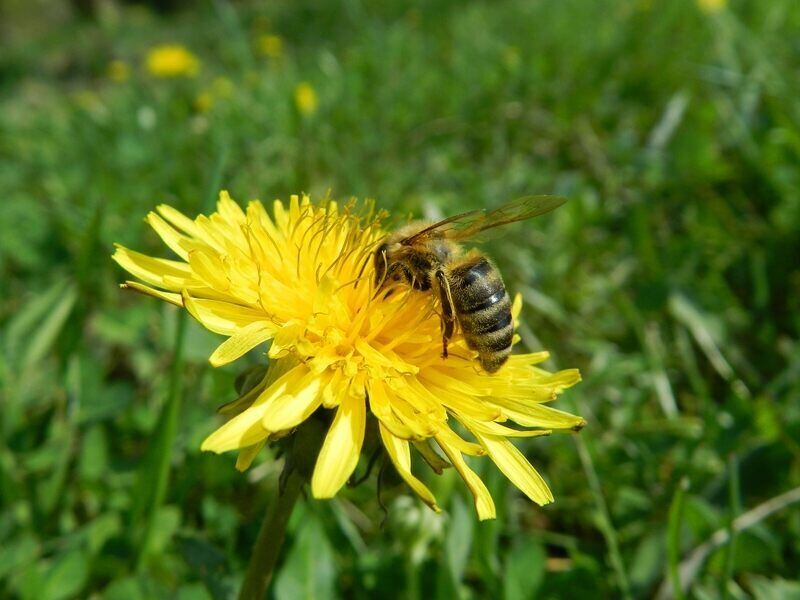
Photo Credit: Pixabay
1. The name: It derives from French, “Dents-de-lions,” which is in turn taken from the Latin “dens leans,” or lion’s tooth.
2. The white puffy part is called the pappus.
3. More than 99% of dandelion seeds land within 10 yards of the parent plant, but the right wind can carry a seed up to 60 miles.
4. It is native to Europe and probably came to the United States on the Mayflower in a medicine kit.
5. In the 1800s, girls would blow on dandelions to see whether the person they loved, loved them in return. All the seeds blown off in one breath meant the feelings were mutual.
6. In the British Isles, it is often called the “piss-a-bed” or “pish-th’bed.” In France, it’s “pissenlit.” All the nicknames are based on its diuretic properties, which increase urination — and the odds of a wet bed.
FAQ About Dandelions
Are Dandelions Good for Your Yard?
Yes, dandelions can be good for your yard. These yellow weeds act as an early food source for pollinators and honeybees in your yard and help aerate compacted soil. When they decompose, they can provide the soil with healthy nutrition, as well.
That said, dandelions are also a weed and can carry diseases (such as tomato ringspot virus) that may harm fruit and vegetable crops.
How Do I Grow Dandelions in My Yard?
If you are one of the few who want to grow dandelions in your yard, the best method is to sow the seeds in the soil. You can sow the seeds from as early as six weeks before the last frost through the end of the summer.
Commercial seed is hard to come by, so if you want to take advantage of dandelions’ impressive health benefits, it is better to harvest the seed heads from dandelions in your own or a neighbor’s (pesticide-free) yard.
How Do You Remove Dandelions from Your Lawn?
The easiest and most effective way to get rid of dandelions is to pull them out. It is important to make sure you get the root out as well; otherwise, the plant will grow back.
There are also many herbicides available for getting rid of dandelions and other weeds that suck the nutrients from the other plants.
Dandelion Dilemmas
As we conclude our exploration into the question, “Are dandelions good for your lawn?” it’s clear that this plant offers significant benefits to your health and to your lawn.
Despite this, they are still weeds and can crowd your yard or garden. For overwhelming dandelion troubles, contact a local lawn care professional. The pros can get rid of the dandelions while you buy dandelion tea at the store, enjoying the perks without the hassle.
Main Image Credit: aivas14 / Flickr / CC BY 2.0

